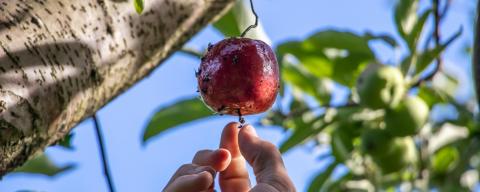The Jumpstart to Produce Safety Program
When you pick up a pint of fresh berries at the farmers’ market or buy crisp greens from a local co-op or grocery store, you’re not just supporting New Hampshire farms, you’re trusting that the food is safe for your family to enjoy. Behind the scenes, farmers across the state are working hard to meet that responsibility through practices that protect produce from field to fork.
At UNH Extension, our Food Safety team partners with farmers to help them understand and apply best practices in safe produce handling, this can range from testing irrigation and produce wash water to improving handwashing stations and keeping harvest tools clean.
Whether big or small, every farm benefits from practical, science-based food safety education. That’s what the Jumpstart to Produce Safety Program, a four-year grant project led by UNH Extension and UMaine Extension has been doing. The program helps small and mid-sized farms put produce safety into practice. Many of these farms aren’t fully covered by the FSMA rules, but they recognize that adopting safe handling practices protects customers and strengthens their businesses.
(FSMA = the Food Safety Modernization Act. The Produce Safety Rule is one of the FDA regulations that farms covered by FSMA must follow. Most NH farms are not fully covered by FSMA)
Through Jumpstart, farmers received:
- On-farm food safety risk assessments
- One-on-one help writing Farm Food Safety Plans
- Tools and templates like cleaning checklists, worker training SOPs, and sanitizer guides
- Follow-up support to track improvements and answer questions
Twenty-eight New Hampshire farms completed the program, making dozens of changes to boost produce safety.
What Changed on Farms?
Farmers tackled practical improvements that made an immediate difference. Some examples include:
- Installing handwashing sinks in convenient locations for workers
- Testing irrigation and wash water to ensure it’s safe
- Adding deer fencing or bird netting to keep wildlife out of crops
- Switching to smooth, easy-to-clean harvest containers
- Writing SOPs for cleaning, harvesting, and worker hygiene
- Upgrading wash-pack areas with double or triple-bay sinks, sanitizer use, and more efficient workflows
These simple changes have an impact on reducing the risk of contamination, improving efficiency, and extending produce shelf life.
Learning Farmer-to-Farmer
One of the most exciting parts of the project is a new micro-learning video series featuring six New Hampshire farmers, and one of the Maine growers who took part in Jumpstart.
In short, 1–3-minute videos, these farmers share how they made mostly low- or no-cost improvements that boosted food safety on their farms. From sharing multiple deer, bird, and insect pest prevention strategies to rethinking wash station setups, these farmer-to-farmer stories highlight practical, doable steps any grower can take.
The videos don’t just show compliance, they showcase creativity, problem-solving, and a shared commitment to safe, local food.
Why It Matters
By investing in produce safety, farms are:
- Reducing the risk of foodborne illness
- Meeting buyer standards for schools, hospitals, and retailers
- Protecting soil and water quality through smarter input use
- Strengthening the local food economy
At its core, Jumpstart to Produce Safety is about more than simply complying with regulations, it’s about building a culture of food safety that keeps communities healthy and farms thriving.
Watch and Learn
The Jumpstart video series is available now for farmers, educators, and anyone interested in learning more about safe food from the ground up. Each video offers practical tips straight from the people who know best: farmers themselves.
These documents were created for the Jumpstart Program or shared by participants:
- Jumpstart Worker Training Record (MS Word)
- Produce Flow Food Safety Plan with Wash Pack Flow Template (PDF)
- Farm Description Template (MS Word)
- Cleaning Log Sheet (MS Word)
- Sanitizer Label (MS Word)
Are you a NH grower interested in learning more about improving efficiency, food quality, and food safety systems on your farm? Contact the UNH farm food safety team at UNH.FoodSafety@unh.edu
This work is supported by Food Safety Outreach Program grant no. 2021-70020-35647 from the USDA National Institute of Food and Agriculture.
Extension Services & Tools That Help NH Farmers Grow
Newsletters: Choose from our many newsletters for production agriculture
Receive Pest Text Alerts - Text UNHIPM to (866) 645-7010










